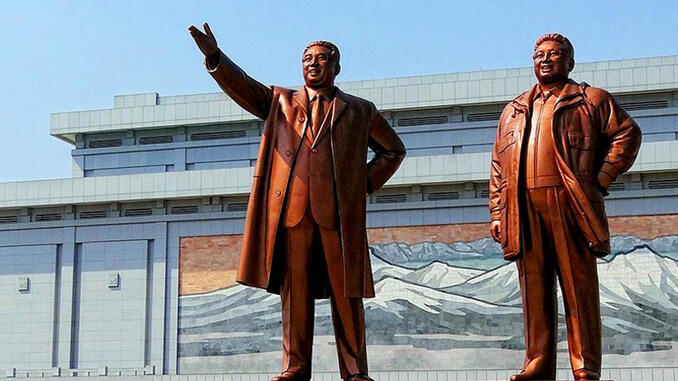
In a very significant development, North Korean leader Kim Jong-un invited U.S. President Donald Trump to a meeting. Trump agreed to the meeting which the White House says will be held by May of this year. The site of the meeting has yet to be determined, however, this would be the highest level meeting ever between the two countries.
South Korean National Security Director Chung Eui-yong made the announcement outside the White House on Thursday night. “North Korean leader Kim Jong Un said he is committed to denuclearization. Kim pledged that North Korea will refrain from any further nuclear or missile tests. He understands that the routine joint military exercises between the Republic of Korea and the United States must continue. And he expressed his eagerness to meet President Trump as soon as possible.”
The move comes after Trump implemented what he terms as the “largest-ever” sanctions by the United States on North Korea and those illicitly aiding it. The new sanctions, announced in February, target more than 50 organizations and shipping vessels, including some in China. China was upset over the new sanctions, but Trump has had some success getting China to turn up the heat on North Korea. U.S. Treasury Secretary said after the announcement of new sanctions that he is “aggressively targeting all illicit avenues used by North Korea to evade sanctions, including taking decisive action to block the vessels, shipping companies and entities across the globe that work on North Korea’s behalf.”
Meanwhile there has been a lot of diplomatic activity in recent weeks between North and South Korea. During the Winter Olympics in PyongChang last month, Kim Jong-un sent his sister Kim Yo Jong to the opening ceremonies to deliver an invitation to Moon Jae-in for a summit. Moon agreed to the summit which is now scheduled to take place at the end of April.
Some analysts are speculating that the recent flurry of diplomatic activity is because Pyongyang is afraid of the effect of the latest sanctions on the stability of its regime, and also the possibility of devastating U.S. military strikes. The diplomatic moves, initiated by North Korea, also come at a time when North Korea has successfully detonated a hydrogen bomb and intercontinental missiles to deliver a nuclear payload anywhere in the United States—at least according to them. Having met their goal, they may feel they are beginning negotiations from an equal footing since they too are now a nuclear power.
So what will the talks look like? It is scary to speculate. Kim Jong-un has been an unpredictable character for his part, and Trump himself is just as unpredictable. Trump just ignored the unanimous opinion of his economic advisers and initiated steel and aluminum tariffs. And when it comes to experts, the experts on North Korea are missing from the Trump administration—experts like Victor Cha and Joseph Yun. Victor Cha was headed to be ambassador to Seoul, but the Trump administration killed his nomination by withdrawing him. And Joseph Yun, the top State Department adviser for North Korea just announced his retirement.
Some argue that the meeting gives North Korea undeserved international legitimacy, something Kim Jong-un and his North Korean regime desperately want. Max Boot, a Jeane J. Kirkpatrick Senior Fellow for National Security Studies at the Council of Foreign Relations showed his concerns about the Trump administration when he wrote, “It may make sense to talk to North Korea, but at a lower level, while maintaining the ‘maximum pressure’ sanctions policy. Eventually the regime may feel so much pain that it will be willing to bargain in earnest. But there is no reason to think that the time is now and much reason to assume that Trump, as usual, doesn’t know what he is doing.”
South Korea is worried about two possible scenarios when it comes to United States diplomacy with North Korea. The first being that diplomatic efforts fail and start a devastating and costly war. The second, that the U.S. would toss aside South Korean interests for a solution. Secretary of State Rex Tillerson tried to put breaks on the latter part by saying that the meeting between Trump and Kim Jong-un are only talks and not negotiations. Though what Tillerson considers the precise difference between talks and negotiations remains unclear.
